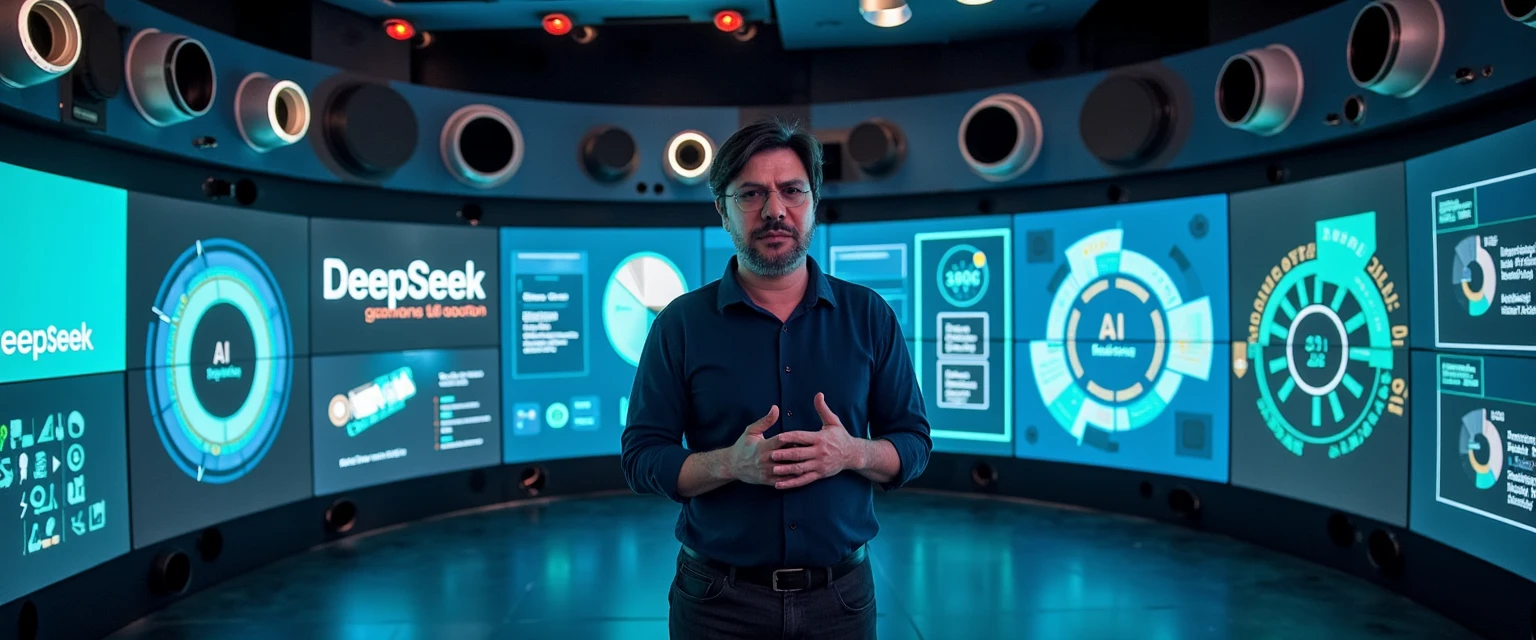AI Radar: From Google vs OpenAI Duel to Global Democratization – What Happened in the Last 24 Hours
April 16, 2025 | by Matos AI

Artificial intelligence continues to accelerate its pace of innovation and global adoption, with several significant developments in the last 24 hours. We are witnessing an increasingly fierce competition between technology giants for supremacy in multimedia content generation, while data shows an unprecedented adoption of these technologies by the global population. At the same time, Brazil is beginning to move in the regulatory field, while national companies find creative ways to apply AI to their businesses.
Google enters AI video generation arena to compete with OpenAI
Google announced its new AI-powered video-generating platform, Veo 2, yesterday. The new feature will be available to Gemini Advanced users and also through Whisk, a feature that turns AI-generated images into short videos. The move is clearly a response to Sora, OpenAI’s impressive video-generating AI that launched in December 2024.
Veo 2 allows the creation of videos of up to 8 seconds in 720p resolution, 16:9 format, with a digital watermark on each frame identifying the production by AI – a practice increasingly necessary in a world where the distinction between human and artificial content becomes more nebulous.
Join my WhatsApp groups! Daily updates with the most relevant news in the AI world and a vibrant community!
- AI for Business: focused on business and strategy.
- AI Builders: with a more technical and hands-on approach.
The AI video generation war is just beginning, and this has profound implications for the creative market. We are witnessing the birth of a new visual language where the boundary between reality and artificial creation is increasingly dissolving. For marketing, communications and content creation professionals, mastering these tools will quickly become an essential competitive differentiator – or perhaps a basic requirement.
OpenAI Releases GPT-4.1: More Power, More Context, Lower Cost
Meanwhile, OpenAI is not standing still and has announced GPT-4.1, the direct successor to GPT-4o. The new model brings a family of options (GPT-4.1, Mini and Nano) with different levels of robustness and price, but all with significant improvements, including a context window about four times larger than the previous generation – supporting up to 1 million tokens, compared to 128 thousand of the previous model.
This expanded context window is particularly relevant for complex analysis of long documents, software development, and extensive content creation. In practice, it means that the model can “remember” and process much more information in a single conversation.
What impresses me most about this update is the strategy of democratization of access through different models with different cost-benefit ratios. With GPT-4.1 Nano, for example, OpenAI is clearly looking to address emerging markets and use cases where cost is a critical factor, without completely sacrificing performance.
AI in Brazilian retail: the Petlove case
Moving from the global scenario to the Brazilian market, we have an interesting example of the practical application of AI in retail with Petlove. According to data from McKinsey, the use of AI in at least one function in the corporate environment reached 72% in 2024, an increase of 17 percentage points compared to the previous year.
Petlove, a pioneer in e-commerce for the pet sector, first implemented AI in the area of customer service. According to Talita Lacerda, CEO of the company: “The first area in which we applied artificial intelligence was in customer service. Today, we have AI-powered bots. This has allowed us to answer simpler questions without necessarily going through human service.”
This is a classic case of first-class intelligent automation., allowing the human team to focus their efforts on more complex and higher-value issues. In my experience with startups, I have seen this pattern repeat itself across several sectors – AI gradually takes over repetitive and predictable tasks, freeing up human potential for more creative and strategic work.
ChatGPT: The fastest-adopting technology in history
One fact that deserves our attention: Sam Altman, CEO of OpenAI, recently revealed that one in ten people on the planet already uses ChatGPT. With 800 million users in less than two years, ChatGPT has become the fastest-adopted technology in human history.
To put this into perspective: It took 16 years for smartphones to reach 1 billion users, 5 years for Facebook to reach 500 million, and now ChatGPT reaches 800 million in less than 24 months. The speed of the adoption curve is simply dizzying.
This number tells us a lot about the times we live in. First, it shows that generative AI has already surpassed the barrier of experimental technology to become a tool for everyday use. Second, it suggests that we are only at the beginning of a profound transformation in the way we work, create and communicate.
Regulate the invisible: AI in the new Civil Code and challenges of the LGPD
In the regulatory field, Brazil is beginning to take its first steps. An update to the Brazilian Civil Code currently being analyzed by the Senate introduces specific rules on the use of artificial intelligence in the country. According to the proposal, the use of AI in the provision of digital services must be clearly identified and follow ethical standards, respecting personality rights and promoting accessibility and transparency.
At the same time, there is an ongoing discussion about the application of the General Data Protection Law (LGPD) to AI platforms, something that has generated intense debates in the legal and academic circles. One of the most controversial points concerns the extraterritoriality of the LGPD, which applies to any personal data processing operation carried out by companies located in Brazil.
Regulating AI is like trying to catch smoke with your hands – the more you try to hold on, the more it slips through your fingers. Technology advances exponentially while regulatory frameworks follow a linear pace, creating a constant and growing gap. Still, it is essential that Brazil establish clear guidelines to prevent abuse and ensure that the benefits of AI are distributed fairly and ethically.
AI and digital security: the predator becomes the hunter
An interesting development comes from Microsoft, whose security division has published a white paper reporting how its AI-based Security Copilot product has detected 20 security flaws in components used in Linux distributions. The vulnerabilities found would allow the installation of extremely difficult-to-detect spyware.
This case illustrates the dual potential of AI in cybersecurity: the same technology that could be used to identify malicious breaches is being used to strengthen defenses. It’s as if we’re creating digital antibodies to fight potential infections before they even manifest.
For Brazilian companies, especially those that deal with sensitive data, Investing in AI-powered security solutions is no longer a differentiator but an existential necessity. In my work with startups, I have emphasized that security is not an expense, but an investment – especially in a context where cyberattacks become more sophisticated every day.
What to do with all this information?
Given this rapidly evolving scenario, what should Brazilian entrepreneurs and leaders do? Here are some practical recommendations:
- Try and learn: Test different AI tools on non-critical processes to understand their capabilities and limitations;
- Identify bottlenecks: Map repetitive or time-consuming processes in your operation – these are natural candidates for AI automation;
- Think beyond automation: AI is not only used to reduce costs, but also to create new products, services and experiences;
- Invest in training: Train your team to work with AI, not against it;
- Stay updated: The speed of change demands constant learning.
In my mentoring with startups and established companies, I’ve seen that those that take an experimental and iterative approach to AI – continually testing, learning, and adjusting – are able to extract far more value from this technology than those that wait for the perfect solution.
The AI revolution is not a one-time event, but an ongoing process of transformation. The challenge is not just to adopt new tools, but to develop a new mindset – one that is agile, adaptable, and always open to learning. If you are interested in discussing how your company can benefit from AI in a strategic and responsible way, I am available for personalized mentoring.
As I always tell the entrepreneurs I follow, the best way to predict the future is to create it. And with the AI tools we have today, we’ve never had more power to shape that future. The question is: what kind of future do we want to build?
✨Did you like it? You can sign up to receive 10K Digital's newsletters in your email, curated by me, with the best content about AI and business.
➡️ Join the 10K Community here
RELATED POSTS
View all



